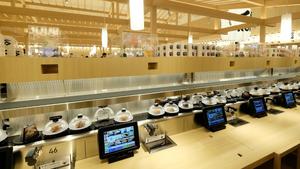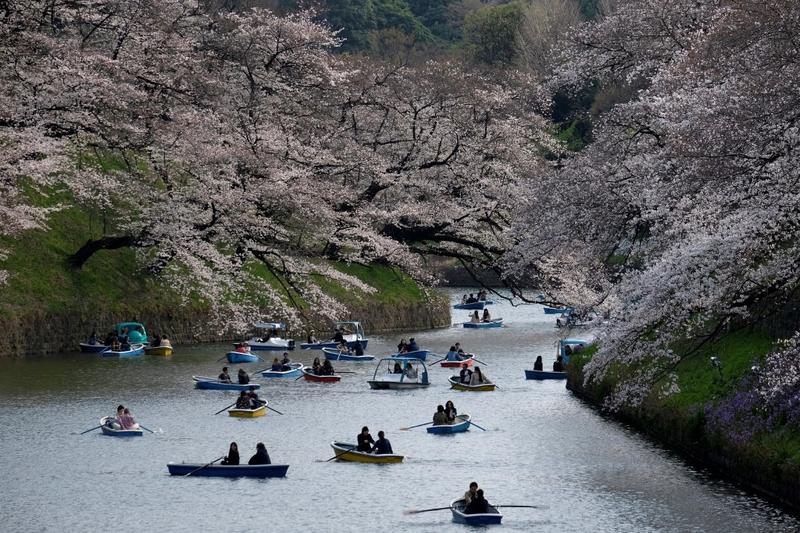 This picture taken on Jan 21, 2020 shows the newly-opened global flagship store for Kura Sushi, a Japanese conveyor belt sushi restaurant chain, in the popular tourist area of Asakusa in Tokyo. (KAZUHIRO NOGI / AFP)
This picture taken on Jan 21, 2020 shows the newly-opened global flagship store for Kura Sushi, a Japanese conveyor belt sushi restaurant chain, in the popular tourist area of Asakusa in Tokyo. (KAZUHIRO NOGI / AFP)
Japan’s attempts to control the coronavirus are leading to some strange sights.
Take the country’s famed conveyor-belt sushi restaurants, where the belts that normally carry morsels direct to customers’ tables now stand still due to hygiene concerns.
Daily life around the world is being reshaped by the spreading virus, but with Japanese Prime Minister Shinzo Abe saying now is a “critical moment” to forestall a mass outbreak, some Japanese companies are taking increasingly desperate steps to stop the spread. The country already has more than 300 confirmed cases despite a profound lack of testing.
ALSO READ: Japan confirms at least 15 new cases; India sees 2 new cases
Restaurants have been some of the hardest-hit by the virus, as more companies encourage remote working and tell staff not to eat out with clients
Sushi chains including Kappa Create Co. and Hamazushi Co. have halted their conveyor belts, asking clients instead to order using touch panels. Restaurants have been some of the hardest-hit by the virus, as more companies encourage remote working and tell staff not to eat out with clients.
And some industries are more vulnerable than others. Movie theaters in the country would normally be readying for one of the busiest times at the box office, with students about to start their spring vacations, which run from the end of March into April.
Instead at 109 Cinemas, a chain run by Tokyu Recreation Co., there’ll be no more sharing a bucket of popcorn. Every second seat will be kept empty in an attempt to attract customers despite a wave of delays to new releases. Those include the latest James Bond movie, Walt Disney Co.’s Mulan remake, as well as installments in domestic franchises Ultraman and Doraemon that target elementary schoolers. Shares in Toho Co., which both runs theaters and releases movies, are down almost 22 percent year-to-date.
Students are being kept at home by an unprecedented call by Abe to shut schools nationwide. Education Minister Koichi Hagiuda said today that 99 percent of schools have responded to Abe’s call, Kyodo reported, affecting around 13 million schoolchildren. That’s bad news for the likes of Round One Corp., which runs amusement centers with bowling alleys and karaoke parlors popular with kids, and which has seen its shares drop to the lowest in more than three years.
Viewing Parties
 This picture taken on March 27, 2019 shows visitors rowing boats past cherry blossoms in the Japanese capital Tokyo. (KAZUHIRO NOGI / AFP)
This picture taken on March 27, 2019 shows visitors rowing boats past cherry blossoms in the Japanese capital Tokyo. (KAZUHIRO NOGI / AFP)
The virus is also poised to disrupt the most iconic time of year in Japan - cherry blossom season. In a few weeks, parks would normally be heaving with revelers, but Tokyo’s government has this year called on residents to refrain from holding cherry-blossom viewing parties, where food and drink traditionally flow liberally, citing the spread of the virus. The cherry blossoms are normally one of the country’s top tourist draws, and by one estimate have an economic impact of more than 650 billion yen (US$6 billion).
READ MORE: James Bond movie release pushed back 7 months amid virus
Meanwhile across the country, concerts and other live events across the nation are being shut down, after more than a dozen infected were identified as being linked to the live music scene in Osaka. Ticket provider Pia Corp. is among the biggest losers, seeing a 40 percent plunge since the start of the year, while storied concert venue operator Tokyo Dome Corp., a recent target for activist investor Seth Fischer, has lost nearly a quarter of its value.
And residents can’t even use the time to get fit. Running machines and exercise bikes are as stationary as the sushi conveyor belts, with gyms identified as another hotspot where the virus has easily spread. Curves Holdings, which runs gyms for women and began trading just Monday in Japan’s first spinoff listing, will shutter its gyms for a week. Shares were down as much as 8.7 percent Thursday.



